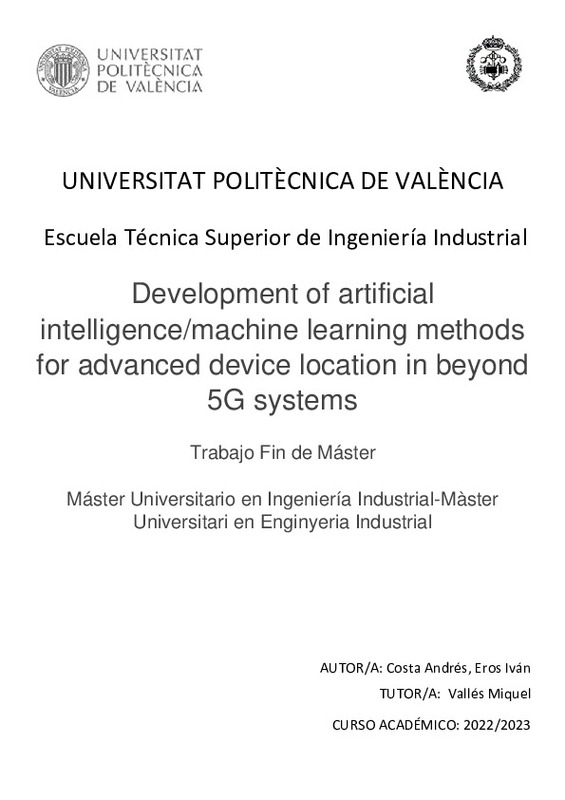JavaScript is disabled for your browser. Some features of this site may not work without it.
Buscar en RiuNet
Listar
Mi cuenta
Estadísticas
Ayuda RiuNet
Admin. UPV
Development of artificial intelligence/machine learning methods for advanced device location in beyond 5G systems
Mostrar el registro sencillo del ítem
Ficheros en el ítem
| dc.contributor.advisor | Vallés Miquel, Marina
|
es_ES |
| dc.contributor.advisor | Tufvesson, Fredrik
|
es_ES |
| dc.contributor.author | Costa Andrés, Eros Iván
|
es_ES |
| dc.date.accessioned | 2023-11-06T17:32:15Z | |
| dc.date.available | 2023-11-06T17:32:15Z | |
| dc.date.created | 2023-09-14 | |
| dc.date.issued | 2023-11-06 | es_ES |
| dc.identifier.uri | http://hdl.handle.net/10251/199356 | |
| dc.description.abstract | [ES] Este trabajo final de máster tiene como objetivo investigar la implementación de funcionalidades inteligencia artificial/aprendizaje automático para la mejora de la precisión de la localización de dispositivos más allá de los sistemas de quinta generación (5G). En este proyecto, el objetivo es el posicionamiento de dispositivos inteligentes o User Equipment (UE) en el interior de una fábrica. Este escenario ha sido elegido debido a que es un escenario de implementación típico estandarizado en el Third Generation Partnership Project (3GPP) y es un escenario relevante para los dispositivos con Industrial Internet of Things (IIoT) dentro del sector industrial. El estudio se basa en el uso de un simulador de MATLAB proporcionado para generar la información necesaria sobre las ubicaciones de los dispositivos y sus mediciones del canal con los puntos emisor-receptor. Este simulador crea el modelo de canal, la geometría del entorno y las referencias de posición alineadas con el 3GPP. Con el objetivo de mitigar los efectos de la propagación multitrayecto, se han desarrollado diferentes métodos de aprendizaje automático en Python. Se han explorado varias Redes Neuronales investigando diferentes entradas, como la respuesta del canal a un impulso u otras características significativas, así como varias salidas del modelo, como la posición directa de los dispositivos, o los ángulos y/o tiempos de las señales de radio. En consecuencia, este proyecto evalúa el rendimiento del posicionamiento directo y asistido por aprendizaje automático frente a los métodos tradicionales, en términos de precisión y complejidad, considerando diferentes estrategias de implementación. En cuanto a la evaluación de la capacidad de generalización de los métodos inteligencia artificial, se han simulado varios escenarios con diferentes configuraciones. Finalmente, otro objetivo ha sido estudiar la viabilidad real de la inteligencia artificial para el posicionamiento de dispositivos 5G y, en ese caso, en qué dirección es más interesante investigar en el futuro. | es_ES |
| dc.description.abstract | [EN] This master thesis aims to investigate the implementation of artificial intelligence/machine learning functionalities for the accuracy improvement of device localization beyond fifth-generation (5G) systems. In this project work, the target is the positioning of smart devices or User Equipment (UE) inside an indoor factory scenario. This setup has been chosen due to it is a typical deployment scenario standardized in Third Generation Partnership Project (3GPP) and it is a relevant scenario for the Industrial Internet of Things (IIoT) devices within the industrial sector. The study is based on the use of a provided MATLAB simulator for generating the required information about the device locations and their channel measurements with the Transmitter Receiver Points. This simulator creates the channel model, environment geometry and position references aligned with the 3GPP. With the goal to mitigate the multipath propagation effects, different machine learning methods have been developed in Python. Several Neural Networks have been explored investigating different inputs, as the Channel Impulse Response or other significant channel features, as well as various model outputs, such as the direct device position, or angles and/or times of the radio signals. Consequently, this project evaluates the positioning performance of the machine learning assisted and direct positioning versus the legacy methods, in terms of accuracy and complexity while considering different deployment strategies. Regarding the generalization ability of the AI/ML methods evaluation, different scenario configurations have been simulated. Finally, another objective has been studying the actual viability of artificial intelligence for 5G device positioning, and in that case which direction is more worthwhile for future investigation. | es_ES |
| dc.format.extent | 70 | es_ES |
| dc.language | Inglés | es_ES |
| dc.publisher | Universitat Politècnica de València | es_ES |
| dc.rights | Reconocimiento - No comercial - Compartir igual (by-nc-sa) | es_ES |
| dc.subject | Inteligencia Artificial | es_ES |
| dc.subject | Localización | es_ES |
| dc.subject | Dispositivos IIoT | es_ES |
| dc.subject | Python | es_ES |
| dc.subject | Señales de radio | es_ES |
| dc.subject | 5G | es_ES |
| dc.subject | 3GPP | es_ES |
| dc.subject | Artificial Intelligence | es_ES |
| dc.subject | Localization | es_ES |
| dc.subject | IIoT devices | es_ES |
| dc.subject | Radio signals | es_ES |
| dc.subject.classification | INGENIERIA DE SISTEMAS Y AUTOMATICA | es_ES |
| dc.subject.other | Máster Universitario en Ingeniería Industrial-Màster Universitari en Enginyeria Industrial | es_ES |
| dc.title | Development of artificial intelligence/machine learning methods for advanced device location in beyond 5G systems | es_ES |
| dc.title.alternative | Desarrollo de métodos de inteligencia artificial/aprendizaje automático para la localización avanzada de dispositivos en sistemas de próxima generación 5G | es_ES |
| dc.title.alternative | Desenvolupament de mètodes d'intel·ligència artificial/aprenentatge automàtic per a la localització avançada de dispositius en sistemes de pròxima generació 5G | es_ES |
| dc.type | Tesis de máster | es_ES |
| dc.rights.accessRights | Abierto | es_ES |
| dc.contributor.affiliation | Universitat Politècnica de València. Departamento de Ingeniería de Sistemas y Automática - Departament d'Enginyeria de Sistemes i Automàtica | es_ES |
| dc.contributor.affiliation | Universitat Politècnica de València. Escuela Técnica Superior de Ingenieros Industriales - Escola Tècnica Superior d'Enginyers Industrials | es_ES |
| dc.description.bibliographicCitation | Costa Andrés, EI. (2023). Development of artificial intelligence/machine learning methods for advanced device location in beyond 5G systems. Universitat Politècnica de València. http://hdl.handle.net/10251/199356 | es_ES |
| dc.description.accrualMethod | TFGM | es_ES |
| dc.relation.pasarela | TFGM\157920 | es_ES |
Este ítem aparece en la(s) siguiente(s) colección(ones)
-
ETSII - Trabajos académicos [10404]
Escuela Técnica Superior de Ingenieros Industriales







